| |
Interviewing
C.G. Chiang
Time:
December 10th, 2006 |
|
|
Q:
|
There
are lots of stories and deeds about your grandfather in many books. Are
they all true?
|
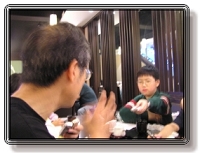 |
|
A:
|
Some
of them are true, some are not completely correct. Things can get
distorted each time they are repeated. When doing historical research,
therefore, it is important to verify things from all respects. I hope
you all will do it for this topic research. |
|
Q:
|
How
many children did Chiang Wei-shui have? He died at only 41 years old.
Did his spirit as a democratic fighter influence his next generation?
|
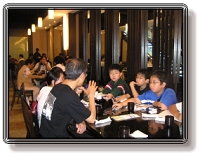 |
|
A: |
Chiang
Wei-shui had four children, on whom his uncompromising spirit can be
found. The eldest son is diligent in academic study. At the age more
than 90 years old, he is still capable of using the most advanced
electronic devices and computer software. He is described as a scholar
who never stops learning. The second son pitifully died at “228
Incident”. The third son, graduated from an advanced college, was a
great man who organized “Taiwan Youth’s Autonomy Association”. The
fourth son was a battlefield reporter who missed in the
Philippines
. All children of Chiang Wei-shui inherited his spirit of strong
national ideology.
|
|
Q:
|
What
was Chiang Wei-shui’s appeal of his many social movements?
|
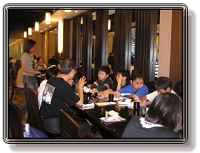 |
|
A: |
He
hoped Taiwanese people could acquire fair and righteous rights, and keep
their own history and tradition. Wishing his people will carry on from
generation to generation, he appealed for the ever-lasting cultural
heritage of Taiwanese. |
|
Q:
|
Was
Chiang Wei-shui persecuted by Japanese in the course of his national
struggle and petitioning?
|
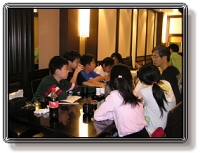 |
|
A: |
Yes,
he was persecuted, and for many times. He was jailed often at North
Police Station (now
Taipei
Ta-tung Police Sub-bureau), which is now, therefore, the preparatory
place for Taiwan New Cultural Movement. Nearly each time when Chiang
Wei-shui wanted to do something for the sake of Taiwanese, he would be
threatened by Japanese. |
|
Q:
|
Could
you introduce the “diagnosis of
Taiwan
” made by Chiang Wei-shui?
|
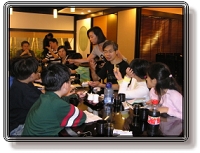 |
|
A: |
In
order to make
Taiwan
have a more peaceful society, Chiang Wei-shui wrote an article “A
Clinical Lecture” in a prescription style for the patient named
Taiwan
. He diagnosed the symptom of
Taiwan
as “intellectual malnutrition”. He thought Taiwanese lacked
anti-colonial and anti-tyrannical sense of national ideology and
democratic thought. He anticipated, therefore, for
Taiwan
as a nation with more power to maintain peace. |
|
Q:
|
For
Taiwan
’s development, what influence and impact did Chiang Wei-shui make?
Why is he called “
Taiwan
’s Sun Yat-sen”?
|
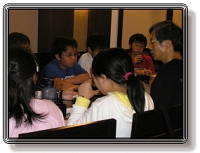 |
|
A: |
To
push for non-violent anti-colonial movements, he established “Taiwan
Minbao”, “New People’s Newspaper”, etc. to inculcate Taiwanese
with the sense of democratic autonomy. He even sent telegrams to the
League of Nations
accusing Japanese of their evildoing. What he did resulted in the
gradual improvement of the tyrannical, oppressive rule by Japanese. With
such a great contribution to Taiwanese and
Taiwan
’s development, he is, therefore, called
Taiwan
’s Sun Yat-sen, the founding father of
China
.
|
|
Q:
|
It
is said that Chiang Wei-shui sent telegrams to the
League of Nations
accusing Japanese of their unreasonable policy of colonialism. Is it
true?
|
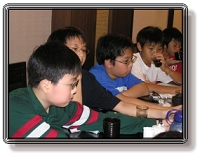 |
|
A: |
He
did sent telegrams to the
League of Nations
accusing the Governor’s Office of its improper colonialism, one time
for the “gradual cut of opium” policy, and another time for
“Wu-she Incident”. |
|
Q:
|
Do
you recognize your grandfather’s trying to assassinate Yuan Shi-kai
and Japanese Emperor? And why?
|
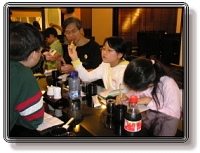 |
|
A: |
I
am half for it and half against it. I recognize his spirit and courage
in trying to get rid of Japanese Emperor who ruled
Taiwan
and Yuan who declared himself emperor. It would be a great delight to
people if successful. Such a bold action, however, could end up in a
tragical consequence to everybody involved. I am, therefore against such
a naivety. |
|
Q:
|
What
do you think that made your grandfather a successful revolutionist?
|
 |
|
A: |
On
the one hand, he studied hard to absorb new knowledge and implemented
it. On the other, he was totally unselfish, devoting wholeheartedly his
life and property to the cause of saving Taiwanese. He always stood in
front to fight at activities but never competed for posts. Such a
fighting spirit with sacrifice made him a successful revolutionist. |
|
Q:
|
What
did your grandfather do that impressed you most?
|
 |
|
A: |
I
admire most that he was a foreseer of the trend of
Taiwan
culture. He was a trailblazer in much respect in
Taiwan
’s history, represented most distinctively by establishing “Taiwan
Cultural Association”. The Association was a big unity of all
Taiwanese elites, making a sensational cultural movement in the great
era of self-consciousness in
1920’
s.
In
the then world trend of anti-imperialism with armed forces by many
disadvantaged peoples, it was unique for Chiang Wei-shui to appeal to
cultural level-up, which avoided sacrificing in vain and the
assimilation by Japanese, setting up national dignity.
“Taiwan
Cultural Association” influenced our culture deeply and far. Now, the
Association’s establishing day, October 17th, has been
officially designated as Taiwan Culture Day, in order to carry on the
spirit of the Association.
|
|
Q:
|
Do
you hope to be a man like him to save
Taiwan
’s history and culture?
|
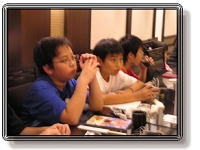 |
|
A: |
In
1921, Chiang Wei-shui published “A Clinical Lecture”, diagnosing
“intellectual malnutrition” suffered by Taiwanese people, who were
under discriminating education of Japanese colonial rule. He proposed
two remedies, culture and education, to reform and save Taiwanese.
Nowadays,
Taiwan
’s society does not stress culture much, ignoring historical lessons.
In May this year, Chiang’s family and other seniors with the same
ideal established “Chiang Wei-shui’s Cultural Foundation” with the
aim to inherit the spirit of “Taiwan Cultural Association”, in order
that everybody may stress the history and culture of his homeland.
|
|
Q:
|
Could
you describe your grandfather in a few simple words?
|
|
|
A: |
To
me, he was a cultural pioneer, and also a national fighter.
|